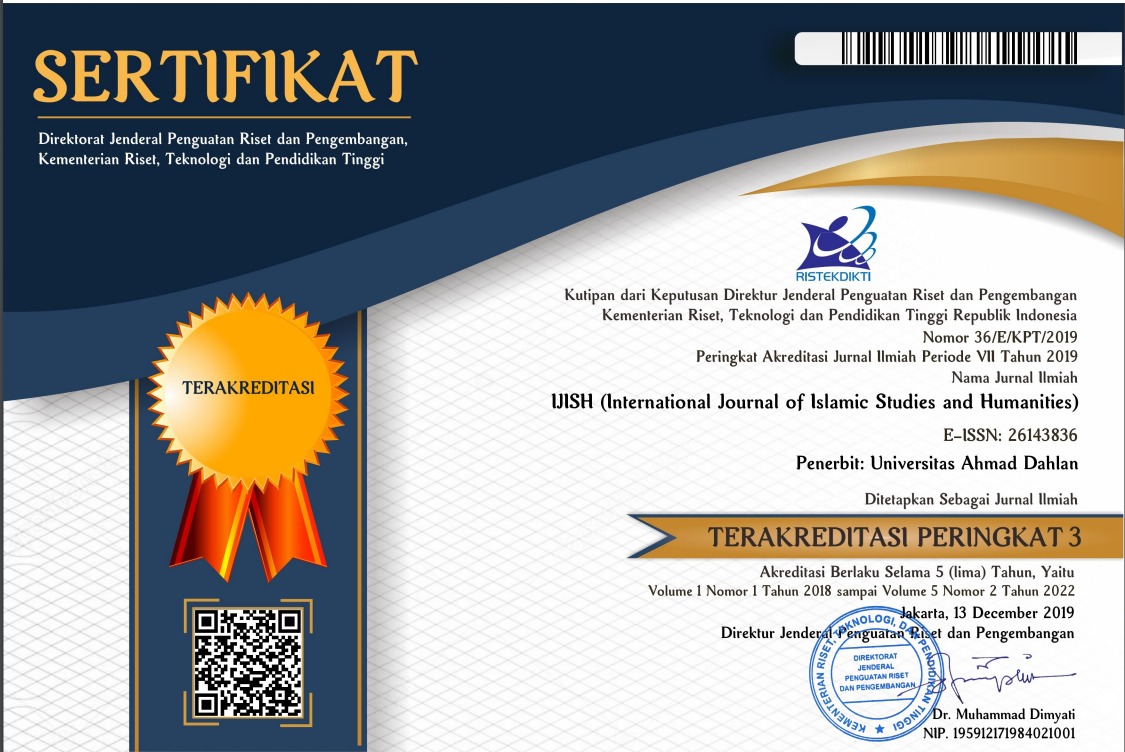Representation of panca jiwa values based entrepreneurship in islamic boarding school
DOI:
https://doi.org/10.26555/ijish.v6i1.7166Keywords:
Panca Jiwa Values, Entrepreneurship, Islamic Boarding School, Islamic educationAbstract
Unemployment is a problem that occurs in many countries. One of the alternatives to reducing unemployment is to foster entrepreneurship. Islamic boarding schools have a strategic role in growing young entrepreneurs, especially in Indonesia. This study aims to find out how the relationship between Panca Jiwa values, which are the spirit of entrepreneurship through learning activities in the Islamic boarding school, and the spirit of students, both those who are still studying and those who have graduated. This study uses a qualitative approach with interviews, observations, and documentation at the Al-Islam Islamic Boarding School in Joresan Mlarak Ponorogo, East Java. The results showed that the cultivation of entrepreneurial values through Panca Jiwa was carried out through curricular, co-curricular, extra-curricular, and other supporting activities. The spirit of sincerity fosters the value of openness and optimism; the spirit of simplicity fosters the value of tenacity; the spirit of independence fosters the value of daring to take risks; the spirit of ukhuwwah Islamiyah grows networks; and the spirit of free thinking fosters the value of critical thinking.
References
References
A.Muhakamurrohman. (2014). Pesantren: Santri, Kiai, dan Tradisi. Ibda’, 12(2).
A, W., & Eachern, M. (2001). Ekonomi Mikro pendekatan Kontemporer. Thomson Learning.
Agus Nahrowi. (2021). interview.
Al-Islam, 2021. (2011). https://alislamjoresan.sch.id/profil/sejarah-alislam-joresan/. 2011.
Arikunto. (2007). Proses Kegiatan Belajar. PT Bumi aksara.
Asnan. (2021). interview.
Bellah, R. N. (1992). Religi Tokugawa: Akat-akar Budaya Jepang,. Gramedia.
Bygrave, W. D. (1994). The Portable MBA in Intrepreneurship. John Willy & Sons.
Cahyo, H., & Setiawan, B. (2019). Pesantren Entrepreneur Mukmin Mandiri. 2(2), 8–18.
Dermawan, A. (2016). Internalisasi Core Values Panca Jiwa Pondok Sebagai Budaya Organisasi (Studi Di Pesantren Putri Al-mawaddah, Coper, Ponorogo). Managemen Dakwah, 2(2).
Frinces, Z. H. (2011). Be An Entepreneur. Graha ilmu.
Haikal. (1996). K.H. Imam Zarkasyi Di Mata Umat. Gontor Press.
Hartono. (2006). Kepatuhan dan Kemandirian Santri: Sebuah Analisis Psikologis. Ibda’, 4(1).
Hisrich, R. D., & MP, P. (1995). Entepreneurship. Irwin Co. Ltd.
Indra, H. (2005). Pesantren dan Transformasi Sosial: Studi atas Pemikiran KH. Abdullah Syafi’i dalam Bidang Pendidikan Islam. Permadani.
Kodrat, D. S., & Christina, W. (2015). Entrepreneurship: Sebuah Ilmu. Erlangga.
Makmun, H. R. (20014). Pembentukan Karakter Berbasis Pendidikan Pesantren. Cendekia Jurnal Kependidikan Dan Kemasyarakatan, 12(2).
Margahana, H., & Triyanto, E. (2019). Solusi Job Creation di Tengah Krisis Global. Edunomika, 03(02).
Masqon, & Dihyatun. (2011). Dynamic of Pondok Pesantren as Indegenous Islamic Education Centre In Indonesia. Tsaqafah, 7(1), 155–168.
Mubyarto, & Dkk. (1992). Etos Kerja dan Kohesi Sosial Masyarakat Sumba, Rote, Sabu, dan Timor Provinsi Nusa Tenggara Timur,. P3K UGM.
Nardi. (2021). interview.
Rahman, B. M. (2017). Pendidikan Karakter Pendidikan Menghidupkan Nilai Untuk Pesantren, Madrasah, Dan Sekolah. The Asia Foundation, Yayasan Paramadina, danAssociation for Living Values Education (ALIVE) Indonesia.
Rasyid, S., Nasri, M., & Sundarini. (n.d.). Kewirausahaan Santri; Bimbingan Santri Mandiri. PT. Citrayudha Alamanda Perdana.
Romdoni, L. N. (2020). Membangun Pendidikan Karakter Santri Melalui panca Jiwa Pondok Pesantren. Pendidikan Agama Islam Al-Thariqah, 5(2).
Sakernas. (2011).
Scharf, R. B. (1995). Kajian Sosiologi Agama (Terj). Machnun Husein. Tiara Wacana.
Siswanto, S. (2018). the Exploration of Pesantren - Based Entrepreneurship Development Strategy Through Teleology Approach. El Harakah (Terakreditasi), 20(2), 191. https://doi.org/10.18860/el.v20i2.5253
Suardi Wekke, I. (2012). PESANTREN DAN PENGEMBANGAN KURIKULUM KEWIRAUSAHAAN: Kajian Pesantren Roudahtul Khuffadz Sorong Papua Barat. Inferensi, 6(2), 205. https://doi.org/10.18326/infsl3.v6i2.205-226
Suhartini. (2009). Problem Kelembangan Pengembangan Ekonomi Pesantren, dalam Pustaka Pesantren (ed), Manajemen Pesantren,. : LKiS.
Suhendra, & Dkk. (2018). Menumbuhkan Jiwa Wirausaha Melalui Pembentukan Koperasi Jasa Berbasis Syariah di Pondok Pesantren Riyadlul Ulum Wadda’wah Kota Tasikmalaya. Abdimas Pedagogi, 02(24), 57–65.
Sumahadimidjaja, S. (1987). Pembangunan Masyarakat Pancasila melalui Pendekatan Mutu SDM dengan Sistem Pendidikan, Sikap, Mental, Wirausaha. Lembaga Bina Wiraswasta.
Suryana. (2003). Ekonomi Kreatif, Ekonomi Baru: Mengubah Ide dan Menciptakan Peluang.
Suryana. (2013). Kewirausahaan: Kiat dan Proses Menuju Sukses. Salemba Empat.
Suryosubroto. (2009). Proses Belajar Mengajar di Sekolah. Rineka Cipta.
Tasmara, T. (2002). Membudayakan Etos Kerja Islam. Gema Insani.
Trimorita, & Dkk. (2014). Pengaruh Agama dan Budaya Terhadap Etos Kerja Pebisnis Muslim Suku Bugis di Kabupaten Nunukan Kalimantan Utara. Millah, XIV(1).
Turner, B. S. (1984). Sosiologi Islam: Suatu Telaah Analitis atas Tesa Sosiologi Weber; terjemahan GA Tocialu. Rajawali Press,.
Ummah, F. S. (2017). Panca Jiwa Pondok Pesantren: Sebuah Analisis Kritis. Joies: Journal of Islamic Education Studies, 2(2), 18–30.
Ust.Masrur. (2021). Interview.
Ust.Suwondo. (2021). interview.
ust.Zamroji. (2020). interview.
Washil, S. (2020). Mentradisikan nilai-nilai Pesantren Panca jiwa. , Islamic Akademika : Jurnal Pendidikan & Keislaman, 7(1).
Zarkasyi. (2012). Definisi dan isi Panca Jiwa Pondok Pesantren.
Zarkasyi, K. A. S. (n.d.). Telaga Hati.
Zimmerer, W., Thomas, N., & Scarborough, M. (1996). Enterpreneurship and The New Venture Fiormation. Prentice Hall Internation Inc.
Zubaedi. (2007). Pemberdayaan Masyarakat Berbasis Pesantren: Kontribusi Fiqh Sosial Kiai Sahal Mahfudh dalam Perubahan Nilai-NilaiPesantren. Pustaka Pealajar.
Downloads
Published
How to Cite
Issue
Section
License
Copyright (c) 2023 Amal Taufiq

This work is licensed under a Creative Commons Attribution-ShareAlike 4.0 International License.
Authors who publish with IJISH (International Journal of Islamic Studies and Humanities) agree to the following terms:
- Authors retain copyright and grant the journal right of first publication with the work simultaneously licensed under a Creative Commons Attribution License (CC BY-SA 4.0) that allows others to share the work with an acknowledgment of the work's authorship and initial publication in this journal.Â
- Authors are able to enter into separate, additional contractual arrangements for the non-exclusive distribution of the journal's published version of the work (e.g., post it to an institutional repository or publish it in a book), with an acknowledgment of its initial publication in this journal.
- Authors are permitted and encouraged to post their work online (e.g., in institutional repositories or on their website) prior to and during the submission process, as it can lead to productive exchanges, as well as earlier and greater citation of published work.

This work is licensed under a Creative Commons Attribution-ShareAlike 4.0 International License.






